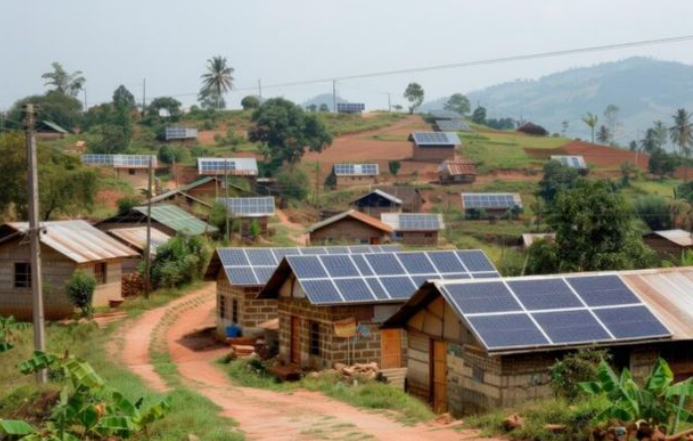Maharashtra Unveils State’s First Solar-Powered Village (GS Paper 2, Government Policies)

Introduction
- In a groundbreaking development for renewable energy, Maharashtra Chief Minister Eknath Shinde has officially launched the Solar Village Scheme, a major initiative aimed at transforming the energy landscape of the state.
- This scheme envisions the complete solar electrification of 100 villages across Maharashtra, marking a significant stride toward sustainable energy solutions.
- Manyachiwadi, a village in Satara district, has become the first beneficiary of this scheme, setting a notable precedent as Maharashtra’s inaugural fully solar-powered village.
Understanding the Solar Village Scheme
- The Solar Village Scheme represents a strategic effort by the Maharashtra government to promote the use of solar energy and reduce reliance on conventional power sources.
- The initiative’s goal is to install solar energy systems in two villages per district, effectively transitioning them to renewable energy sources.
Key Objectives of the Scheme:
- Elimination of Electricity Bills: Under the PM Suryagarh Muft Bijali Yojana, households in the designated villages will not incur electricity bills. This aspect of the scheme aims to alleviate financial burdens on residents, especially those in lower-income brackets.
- Free Electricity for Farmers: The scheme extends its benefits to the agricultural community by providing free electricity to farmers. This support is expected to reduce operational costs and enhance productivity in the agricultural sector.
Recent Milestones:
- Manyachiwadi's Achievement: Manyachiwadi’s transition to a fully solar-powered village stands as a pioneering success for the scheme. This achievement not only highlights the feasibility of solar energy in rural settings but also sets a benchmark for the implementation of similar projects in other villages.
- Future Expansions: Building on the success of Manyachiwadi, the scheme plans to expand its reach to other areas, including Shivtirth Nagar in Kothrud and Sector 25 in Nigdi. These upcoming projects will contribute to the broader goal of widespread solar energy adoption in Maharashtra.
Government Support and Implementation:
- The initiative has garnered strong support from Maharashtra's political leadership, including Deputy Chief Minister Devendra Fadnavis.
- This backing underscores a firm commitment to advancing renewable energy and enhancing the quality of life for rural communities.
- The scheme's success in Manyachiwadi is expected to demonstrate the tangible benefits of solar energy, potentially encouraging further adoption across the state.
Insights on the PM Suryagarh Muft Bijali Yojana
- The PM Suryagarh Muft Bijali Yojana plays a crucial role in the Solar Village Scheme.
- It aims to provide free electricity to economically disadvantaged families in rural areas by harnessing solar power.
- The program not only supports clean energy goals but also seeks to stimulate local economies and improve living standards.
- The scheme operates through collaborations with state governments and energy departments, ensuring that its objectives align with India’s broader renewable energy targets.
- To qualify for the program, families must meet specific criteria, and extensive awareness campaigns are conducted to inform eligible households.
- Additionally, the scheme emphasizes the inclusion of women in energy access efforts, promoting gender equity in the renewable energy sector.
Conclusion
- The launch of the Solar Village Scheme and the successful transformation of Manyachiwadi into Maharashtra’s first fully solar-powered village represent a significant milestone in the state’s journey towards sustainable energy.
- By eliminating electricity bills for residents and providing free power to farmers, the scheme addresses both economic and environmental challenges.
- The government’s commitment, coupled with the scheme’s strategic expansion plans, positions Maharashtra as a leader in renewable energy adoption.
- As more villages transition to solar power, the initiative is poised to enhance the quality of life for rural communities, contribute to India’s renewable energy goals, and set a positive example for other states to follow.


